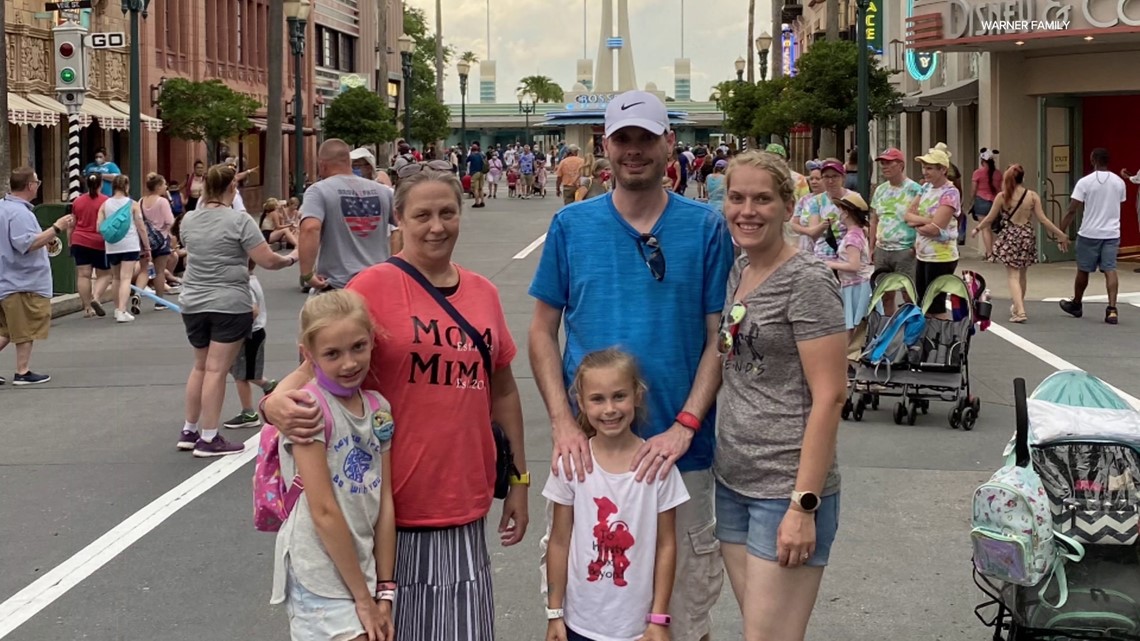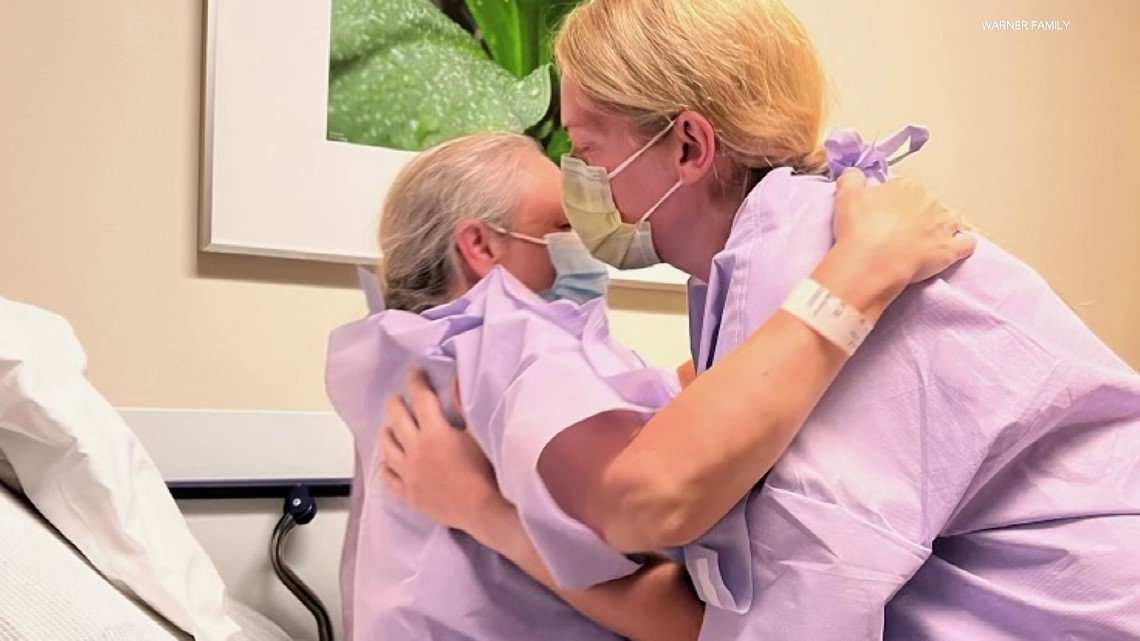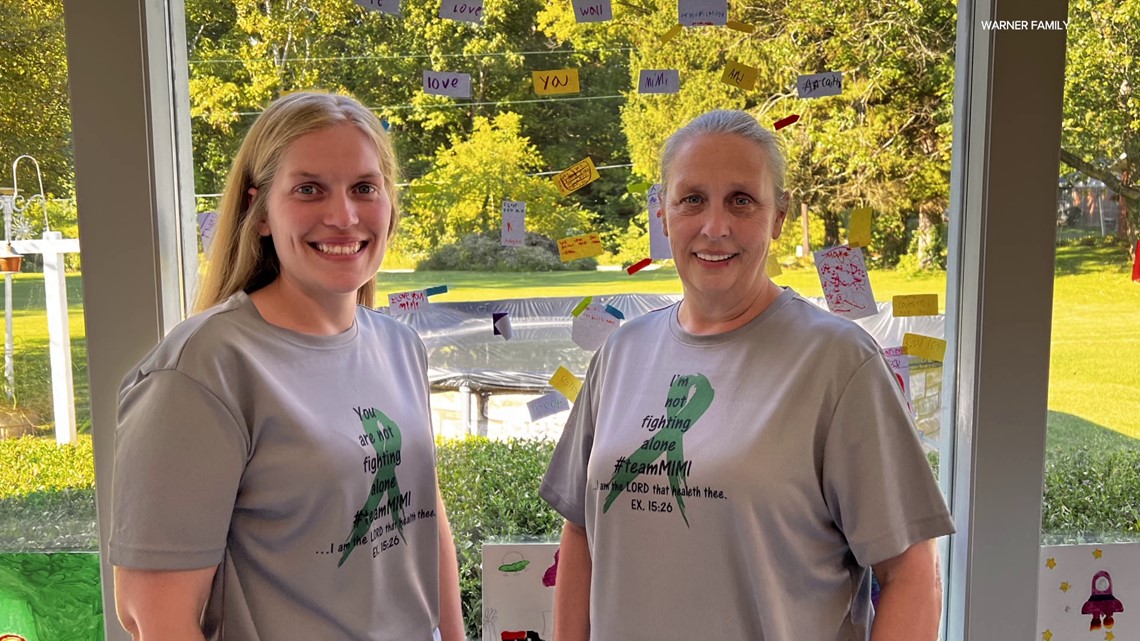Doctors said they took 60% of Caitlyn’s liver and transplanted it into her mother-in-law. The operation took 12-hours.
INDIANAPOLIS — Rebecca Warner’s life is full, with children and nine granddaughters. But the 59-year-old’s future became unclear when she got sick in 2021.
“They did a live biopsy and found out we were in end-stage liver disease. My only hope was to get a liver transplant,” said Rebecca.
“She had end-stage liver disease, yet it was not advanced that she was not really sick in the hospital,” said IU Health liver transplant surgeon Dr. Chandrashekhar Kubal.
Rebecca had a family history of liver disease and knew the outcome could be dire.
“I had a sibling pass away from that. My mother passed away with that, and I had another sibling who also had it,” Rebecca said.
Her best option was to find a willing donor with a compatible blood type.
“She needed it because every day was difficult for her with fatigue and weakness and quality of life was really compromised,” said Kubal. “She really needed the transplant, but she was at the bottom of the transplant wait list.”
Rebecca talked to her family about her health situation. Her three daughters-in-law and her son offered to donate their liver.
“I took it to my kids, and I told my husband, ‘I need God to confirm what I need to do because I’m not going to ask anybody.’ (Caitlyn) sent me a text two days later and said, ‘Mom, I feel like I’m going to be your donor. I need to be your donor,'” said Rebecca.


After a number of tests, it was determined her daughter-in-law, Caitlyn Warner, was a perfect match.
“I had been praying and thinking about it a lot and just came to the conclusion that I was her donor,” said Caitlyn. “I’ve got to save her life.”
Caitlyn is married and the mother of two children.
“It was actually a very easy decision, because Rebecca has always put her entire family first. Anything that needs to be done, drop of a hat, she’s there. She helps out,” said Caitlyn. “So, for me, I knew it was a big surgery and I’d be down for a few weeks. But me being down for a few weeks compared to giving her years of life left so she could see her granddaughters graduate from high school, get married, have their own kids. That was enough for me to go, ‘Yeah, we’re going to do this.'”
Kubal said it’s very common for a blood relative to make a liver donation to a family member. But, this was an uncommon situation.
“Daughter-in-law donates to mother-in-law was unique. But, we’ve seen a few,” said Kubal. “It really shows how tight the family bonds are and how well the families work together.”
Both women checked into IU Health University Hospital on Oct. 24, 2022.
“I had a peace, but I was also nervous,” said Rebecca. “I was more nervous for her, because I was doing OK. They took her back a long time before they took me back because they had to get her started.
“When they came in and said they had started her incision, that was hard for me, I knew what she was facing. I knew why she was doing it. I had a peace, but I love this girl with all my heart.”


Kubal said he took 60% of Caitlyn’s liver and transplanted it into her mother-in-law. The operation took 12 hours.
“They don’t normally let patients in other patient’s rooms. But they let me down to see her. That made my day,” said Rebecca. “I wanted to hug her really bad. But we were both so sore. I couldn’t bend over. She was laying down. Thanks was not enough.”
It has now been one year since the transplant surgery.
“The liver is a remarkable organ. It has the capacity to regenerate. One can take up to 80% of the liver and the rest will regenerate,” said Kubal. “We make sure 30% of the liver is left behind and it regenerates within two months.”
Caitlyn’s liver has completely regenerated. She is now training for the 2024 OneAmerica 500 Festival Mini-Marathon. Rebecca is back singing at church in Brazil, Indiana.
“Liver transplantation has a really good longevity,” said Kubal. “If the recipients take their medications well and follow up with their clinic visits, they have a long way to go. Particularly, the living donor transplants do better than the deceased liver transplant patients. I think she’s going to do really well.”


The two women, connected through family and now by a selfless act of love.
“She’s my hero. She is my hero,” said Rebecca.
“I don’t know that I’d call myself a hero. I’m just someone who did what needed to be done. She needed her life saved. I did all I could to save her life,” said Caitlyn.
“I will never be able to tell her thank you enough times in my life to tell her. She changed my life. I fell in love with her the day my son brought her home and introduced us to her. We’ve always been close. But this put a bond there that will never be broken,” said Rebecca.
To learn more about the IU Health Liver Transplants, click on this link.
